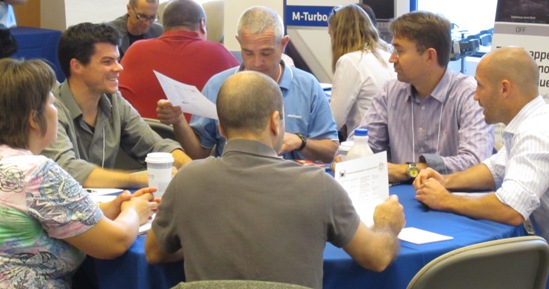
Researchers and clinicians at the 2nd International Scientific Tendon Symposium (ISTS) at Vancouver General Hospital
Over the past ten years, through clinical and basic science studies, researchers and clinicians have seen many new developments in tendon treatment and diagnosis. One notable change is to the name itself that clinicians and patients have used for years – “tendonitis” is now referred to as “tendinopathy”, which includes inflammatory conditions, such as tendinitis, as well as the more common chronic condition, tendinosis.
Changes to tendon injury diagnosis and treatment, as well as future directions of research, were discussed at the 2nd International Scientific Tendon Symposium (ISTS), led by Dr. Alex Scott, researcher and physiotherapist with the Centre for Hip Health and Mobility (CHHM) at VGH. The Symposium brought together over 100 participants, including international experts in tendon imaging, pathology, surgical options, rehabilitation, outcome measures, and knowledge translation.
Advancements in injury diagnostics, such as Ultrasound Tissue Characterization (UTC), are generating interest among both researchers and clinicians. This new imaging technology provides high quality information about the structure of the large lower extremity tendons, such as the Achilles and patellar tendons, helping clinicians to better monitor patient responses to rehabilitation and drug therapies. The primary condition in these chronically painful tendons is usually tendinosis – a structural disorganization of collagen fibres – which UTC can measure with unprecedented accuracy.
An emerging treatment, presented at the Symposium, involves the application of glyceryl trinitrate patches (traditionally used for angina pain) directly over painful tendons. This treatment was shown in pre-clinical studies to stimulate tendon repair activities. However, new data from a clinical trial demonstrated that it is unlikely to be effective for patellar tendinopathy.
Findings from the Symposium will also help shape the direction of tendon related research. Researchers from Australia reported that corticosteroid treatment of elbow tendons leads to harmful long term effects and greater risk of injury recurrence, despite a short term reduction in pain – adding to a body of knowledge that this treatment needs to be reconsidered.
“Researchers need to continue their efforts towards developing new therapies, but also to designing definitive studies capable of supporting or refuting treatments that are already in common use – both types of research were well represented at the symposium” says Dr. Scott.
Outcomes from the symposium will be published in the British Journal of Sports Medicine. For more information on VCH Research visit www.vchri.ca. For the Centre for Hip Health and Mobility visit www.hiphealth.ca.
